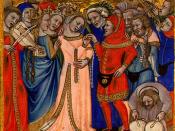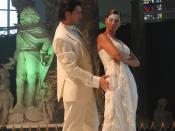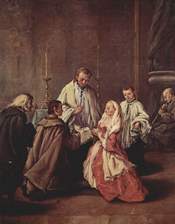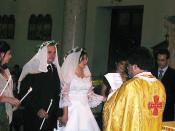The Education: What is Necessary to get Married.
Marriage is a covenant made between a man and a woman which brings unity and indissolubility between two individuals. In order to ensure its sacredness and theological understanding of marriage, the Catholic Church justifies its legislation to further promote and develop a healthy partnership between two individuals. The church has developed norms in regard to the preparation for marriage, capacity to enter into marriage, record keeping of marriage celebrated within the church and certain rights and obligations of the spouses.
The canonical preparations for marriage may include, but do not require the engagement. Law strictly prescribes other canonical preparations. The couple is embraced in a prenuptial investigation. During this preparation, the pastor assists the couple in a variety of ways. First, he preaches to the couple so that Christ's faithful are instructed in the meaning of Christian marriage and in the role of Christian spouses and parents.
Second, the priest helps by personal preparation for entering marriage, so that the spouses are disposed to the holiness and the obligations of their new state. The priest celebrates the marriage liturgy, and also assists by the help given to those who have entered marriage, so that by faithfully observing and protecting their conjugal covenant, they may achieve a holier and a fuller family life. During the 4 to 6 month preparations for the Sacrament of Marriage, the couple is obliged to attend sessions to help fulfill their requirements. The following diagram outlines the priests' objectives and agenda for each of three sessions with the couple.
Accordingly, before the marriage, it must be certain that the valid and lawful celebration is not barred by any prohibition of Canon Law. This investigation is governed by the norms issued by the local ordinary, which are usually implemented in the form of a questionnaire. The immediate objects the inquiry are the presence of any canonical prohibitions, the freedom matrimonial consent, the lawfulness of the marriage, and the adequacy of instruction in Christian doctrine. Canon Law does describe many of these requirements in order to be married. For example, Catholics who have not yet received the sacrament of confirmation are to receive it before being admitted to marriage. So that the sacrament of marriage may be fruitfully received, spouses are earnestly recommended that they approach the sacraments of penance and the blessed Eucharist, and also be baptized in the Catholic Church. Special rules follow if one of the individuals entering the marriage is not Catholic. Also according to Cannon Law, a man cannot validly enter marriage before the completion of his sixteenth year of age, nor a woman before the completion of her fourteenth year. These are only a few of the many restrictions set forth by Canon Law.





